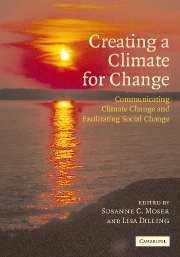Book contents
- Frontmatter
- Contents
- Preface
- Foreword
- List of contributors
- List of tables
- List of figures
- List of text boxes
- Introduction
- Part I Communicating climate change
- Part II Facilitating social change
- 15 Stuck in the slow lane of behavior change? A not-so-superhuman perspective on getting out of our cars
- 16 Consumption behavior and narratives about the good life
- 17 Educating for “intelligent environmental action” in an age of global warming
- 18 Education for global responsibility
- 19 Changing the world one household at a time: Portland's 30-day program to lose 5,000 pounds
- 20 Changing organizational ethics and practices toward climate and environment
- 21 Change in the marketplace: business leadership and communication
- 22 The market as messenger: sending the right signals
- 23 Making it easy: establishing energy efficiency and renewable energy as routine best practice
- 24 Forming networks, enabling leaders, financing action: the Cities for Climate Protection™ campaign
- 25 Ending the piecemeal approach: Santa Monica's comprehensive plan for sustainability
- 26 States leading the way on climate change action: the view from the Northeast
- 27 West Coast Governors' Global Warming Initiative: using regional partnerships to coordinate climate action
- 28 Building social movements
- 29 Climate litigation: shaping public policy and stimulating debate
- 30 The moral and political challenges of climate change
- Part III Creating a climate for change
- About the authors
- Index
- References
30 - The moral and political challenges of climate change
Published online by Cambridge University Press: 20 August 2009
- Frontmatter
- Contents
- Preface
- Foreword
- List of contributors
- List of tables
- List of figures
- List of text boxes
- Introduction
- Part I Communicating climate change
- Part II Facilitating social change
- 15 Stuck in the slow lane of behavior change? A not-so-superhuman perspective on getting out of our cars
- 16 Consumption behavior and narratives about the good life
- 17 Educating for “intelligent environmental action” in an age of global warming
- 18 Education for global responsibility
- 19 Changing the world one household at a time: Portland's 30-day program to lose 5,000 pounds
- 20 Changing organizational ethics and practices toward climate and environment
- 21 Change in the marketplace: business leadership and communication
- 22 The market as messenger: sending the right signals
- 23 Making it easy: establishing energy efficiency and renewable energy as routine best practice
- 24 Forming networks, enabling leaders, financing action: the Cities for Climate Protection™ campaign
- 25 Ending the piecemeal approach: Santa Monica's comprehensive plan for sustainability
- 26 States leading the way on climate change action: the view from the Northeast
- 27 West Coast Governors' Global Warming Initiative: using regional partnerships to coordinate climate action
- 28 Building social movements
- 29 Climate litigation: shaping public policy and stimulating debate
- 30 The moral and political challenges of climate change
- Part III Creating a climate for change
- About the authors
- Index
- References
Summary
Climate change presents us with a complex moral problem that our current political system is not well suited to address. Thus, it should not be surprising that we are failing to address it. In fact, climate change presents us with several distinct challenges. The first and most obvious involves coping with the changing climate itself. For societies that are not well adapted to normal climate variability in the first place, the more frequent and extreme events produced by climate change will be devastating. These effects will ramify through their economic, social, and political systems, spreading out into the international order. In addition, much of what we value about non-human nature will be lost since the clock of evolutionary adaptation runs much more slowly than that of human-caused environmental change. These are the kinds of problems that we can expect to face on the relatively optimistic scenario that the shifts in the earth system caused by climate change will be relatively moderate. Should major ocean or atmospheric circulations fail or sea levels rise catastrophically, the whole idea of adaptation will seem “quaint” at best.
Climate change as a moral problem
While the challenge of coping with a changing climate is daunting, it is one that is widely recognized and discussed. The moral and political challenges of climate change are relatively neglected. Climate change is a dramatic challenge to our moral consciousness, but it is not often perceived this way because it lacks some of the characteristics of a paradigm moral problem.
- Type
- Chapter
- Information
- Creating a Climate for ChangeCommunicating Climate Change and Facilitating Social Change, pp. 475 - 482Publisher: Cambridge University PressPrint publication year: 2007
References
- 21
- Cited by

